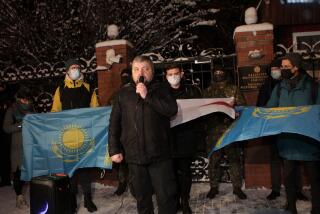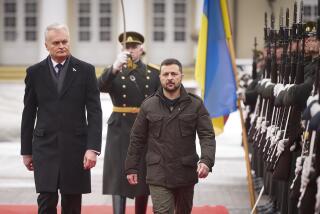Baltic Repression Timed With Gulf War, Activists Say
- Share via
WASHINGTON — When news that bombs were falling on Baghdad blared from the car radio, Angela Nelsas’ heart filled with fear.
The Fullerton activist’s first concern was for the soldiers and citizens of her adopted country, the United States. But her second thought was of the potential for disaster in a small, struggling republic thousands of miles from the Middle East.
“It seems all the attention is now on the gulf,” said Nelsas, who was born Angele Barkauskas in what before World War II was the independent republic of Lithuania. “And that makes me frightened to death that this will give the Soviets the opportunity to move against Lithuania without so much attention.”
Nelsas is president of the Baltic-American Freedom League, a 10-year-old organization dedicated to freeing Lithuania, Latvia and Estonia, the three Baltic states seized by Josef Stalin in 1940.
She has been in Washington for a week, lobbying Congress and the White House for a tougher U.S. response to the Soviet crackdown on the popularly elected Lithuanian government. The confrontation has left 14 dead and scores injured.
Nelsas--who has lived in Orange County for more than 28 years with her husband, a business executive--is not alone in her concern that the outbreak of war in the Persian Gulf will divert the world’s attention from the trouble in the Baltics.
UC Irvine political scientist Rein Taagepera, who was elected to the congress of the neighboring Baltic state of Estonia in March, said many Estonians were predicting as early as December that Soviet troops would move on Lithuania, Latvia and their own land once fighting began in the gulf.
He cited the Soviet invasion of Hungary in 1956, while the United States and Britain battled Egypt over Cairo’s closure of the Suez Canal, and the invasion of Afghanistan in late 1979 during the protracted hostage crisis in Iran.
“It was commonly suspected that once the United Nations deadline passed, the Soviets would use this moment to crack down in the Baltics,” said Taagepera, a leading U.S. expert on Baltic politics. “So this came as no surprise to people there.”
He called for swift U.S. government sanctions against Moscow.
And at a hearing Thursday, members of the congressional Commission on Security and Cooperation in Europe, commonly known as the Helsinki Commission, voiced similar concerns, as Nelsas and dozens of others attended.
“This is typical of what the Soviets did in 1956, when they used the cover of the Suez crisis to move into Hungary,” said Sen. Alfonse M. D’Amato (R-N.Y.).
“The Administration has acted to staunchly oppose the occupation and annexation of Kuwait” by Saddam Hussein, said Rep. Don Ritter (R-Pa.). “Now, Congress and the Administration must begin to act--not just talk--to stop the same international injustice in Lithuania and the other Baltic nations.”
The attack by Soviet tanks and soldiers last weekend in Vilnius, the Lithuanian capital, is only the latest evidence that the United States must take an unblinking stand against Soviet President Mikhail S. Gorbachev if the Baltics are ever to be free, several congressmen said.
Nelsas could not agree more: “The President is saying that it’s unacceptable that Iraq occupied Kuwait. The same thing happened to Lithuania 50 years ago. We feel that this whole crackdown and the bloodshed was really programmed to coincide with events in the gulf.”
Nelsas was one of a 14 Baltic-American leaders who met in April with President Bush to make their case for a U.S. push for Baltic independence. She was at the White House again Monday, this time for a meeting with National Security Council staff members.
While the White House response to her pleas has been disappointing, Nelsas said, she believes that she is making headway in Congress, where a push is afoot to suspend credits for Soviet agricultural purchases and provide direct aid to the beleaguered Lithuanian government.
On Thursday, Sen. D’Amato said the United States should try to strip Gorbachev of the Nobel Peace Prize he won last year. Furthermore, he plans to introduce a resolution calling on Bush to formally recognize the elected governments of Lithuania, Latvia and Estonia.
Sens. Robert C. Byrd (D-W.Va.) and Bob Dole (R-Kan.) introduced a resolution earlier this week calling on Bush to review immediately all economic aid to the Soviet Union and consider withdrawing Soviet membership in the International Monetary Fund and the General Agreement on Tariffs and Trade.
And Rep. Christopher Cox (R-Newport Beach), who traveled to Lithuania last year despite resistance by Soviet authorities, on Friday introduced a measure that would bar the U.S. Import-Export Bank from subsidizing sales to the Soviet Union, prohibit further extension of agricultural credits, make the Soviet Union ineligible for certain trade concessions and hold up implementation of a U.S.-Soviet trade treaty.
“What is needed now is quick response from Congress to what Gorbachev has done,” Cox said, “a response with teeth in it.”
Not everyone in Congress agrees. Rep. Bill Richardson (D-N.M.) said he is not ready to give up on Gorbachev. He expressed hope that the Soviet leader will continue reforms he began six years ago.
And members of Congress from grain-producing states, which profit from grain sales to the Soviet Union, have been loath to jump on the Baltic bandwagon.
None of that fazes Nelsas.
“We will not give up,” she said. “We have fought for 50 years, and we will not give up now.”
Nelsas is all too familiar with the history of Soviet oppression in the Baltics. As a young girl, she fled Lithuania with her parents and two sisters in 1944, as Soviet troops marched into the country for the second time, displacing the Germans, who had occupied the country for nearly four years.
Nelsas’ father, Kipras Barkauskas, had discovered his name on a list of Lithuanians scheduled to be deported to Siberia. A breeder of riding horses, Barkauskas fled with his family and four horses to East Prussia, where he lived in the countryside until the end of the war.
Nelsas’ grandparents were not so lucky. They were captured by Soviet soldiers invading Germany and sent to Siberia, where they died.
After the war, the Barkauskas family lived in refugee camps in Germany. Finally, in 1950, the family received permission to emigrate to the United States, eventually settling in Chicago.
There, Angela Barkauskas--her name now anglicized to Angela--met and married Ronald Nelsas, who became a successful executive in the import-export warehousing business. They moved to Orange County in 1962 and became the parents of three daughters.
Nelsas’ activism began in a small way. She worked with a Lithuanian relief organization and for 10 years taught Lithuanian history and culture at a Saturday school at St. Casimir Lithuanian Catholic Church in the Los Feliz district of Los Angeles. A longtime official in a national group called the Lithuanian American Community, Nelsas joined the Baltic-American Freedom League three years ago.
Last year, she said, she spent almost as much time in Washington as she did in California. And she may find herself here again for much of 1991.
“It is our apprehension,” she said, “that unless our President and the Congress come forth with a very strong position, that the Soviets will take the last steps in this crackdown . . . coinciding with the gulf (war).
“We would like to see our government prevent further bloodshed.”
Times staff writer Kristina Lindgren contributed to this report.
More to Read
Sign up for Essential California
The most important California stories and recommendations in your inbox every morning.
You may occasionally receive promotional content from the Los Angeles Times.













